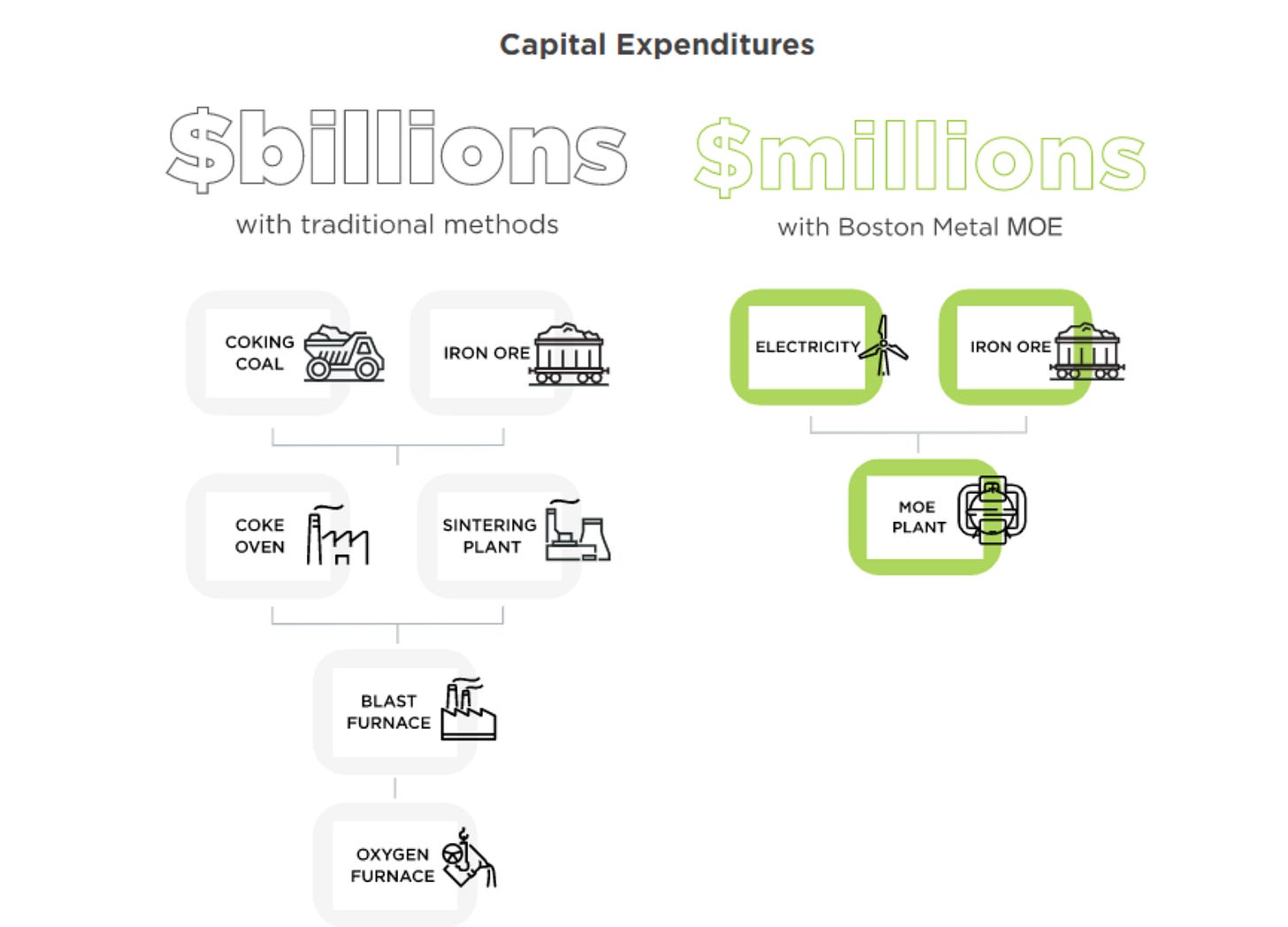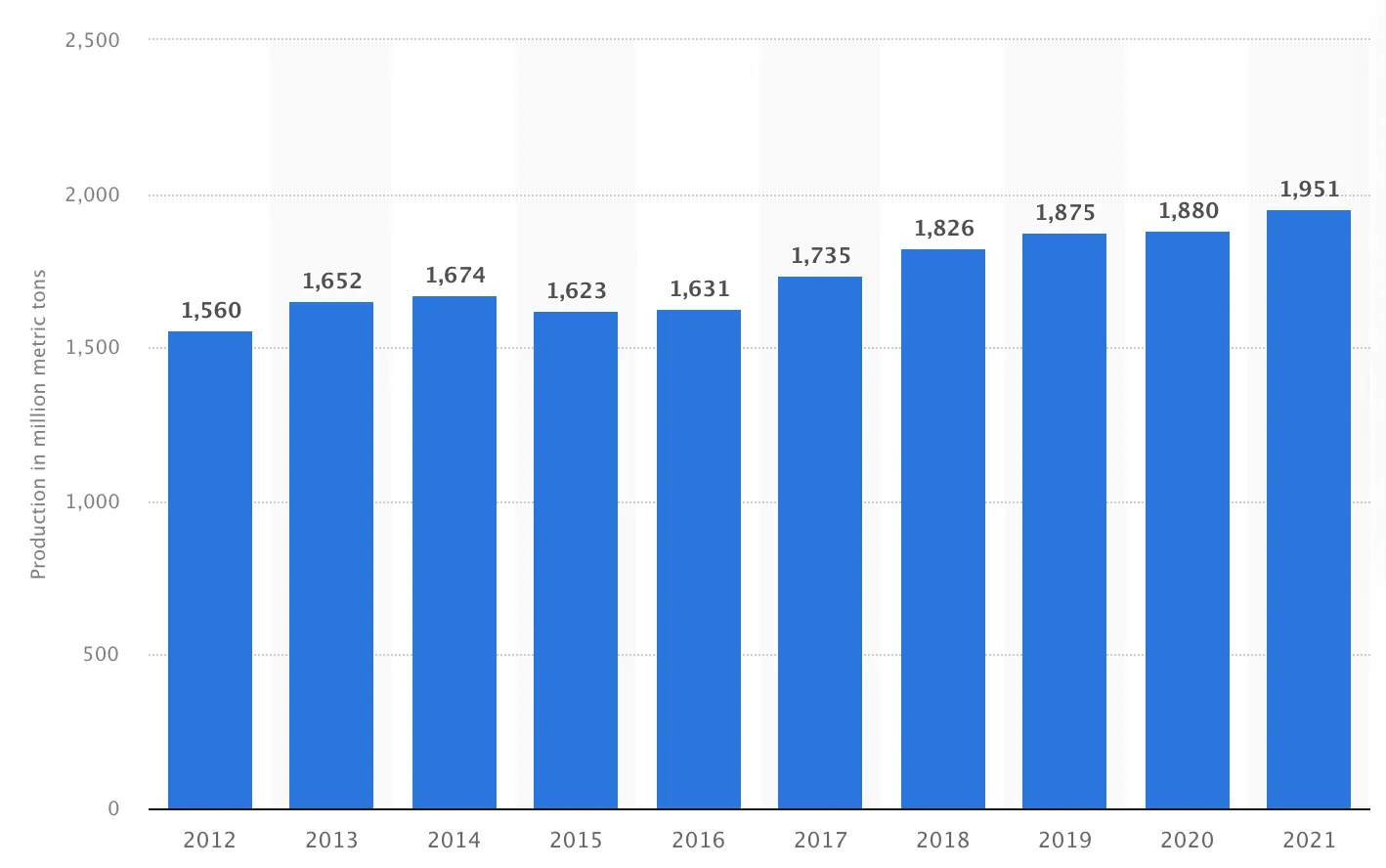#61 Boston Metal
Decarbonizing steelmaking with electricity
Read time: 5 minutes
Hi, I’m Javi Gascón.
This is Climate Tech Distillery, a newsletter where I talk about one specific climate tech company every week.
Subscribe for free to receive my weekly articles in your inbox.
Today we’ll distill a company that’s revolutionizing steel with an emissions-free, electric process: Boston Metal 🇺🇸
Want to sponsor Climate Tech Distillery? Here’s all the info.
What Problem Does Boston Metal Tackle❓
They deal with the several problems associated with the environmental and emissions impact of steel production. You have all the details about the steel issue here. This is a summary:
1. Carbon Emissions: Currently steel production represents 7% of global greenhouse gas emissions, with over 50% being made in China. Making 1 ton of steel the traditional way produces about 1.8 tonnes of CO2.
2. Air Pollution: The steel industry is a significant source of criteria air pollutants, including sulfur dioxide (SO2), nitrogen oxides (NOx), particulate matter (PM), and non-methane volatile organic compounds (NMVOC).
3. Resource Consumption and Waste: We produce 2 billion tonnes of steel per year. That means 14% of industrial energy is used for this and millions of tonnes of solid and hazardous wastes are produced each year.
4. Environmental Degradation: The process involves mineral extraction, water contamination, and the release of harmful chemicals, contributing to environmental degradation and health risks.
We need to make this critical material green.
Product / Service 📦
Luckily Boston Metal is using Molten Oxide Electrolysis (MOE) technology to solve this. It revolutionizes steel production by using renewable electricity to convert iron ore directly into high-purity liquid metal (0 needed!).
Zero Carbon Emissions: The MOE process is fossil-free. Electricity is applied to iron ore in a cell, heating it to 1,600°C and splitting iron oxide bonds to produce pure liquid metal, with oxygen as the only byproduct.
Efficiency and Simplicity: The process is a single-step method that bypasses multiple stages of traditional steelmaking, such as coke production, sintering, and pelletizing, reducing energy inputs and the physical footprint required.
Cost-Competitive: With abundant low-cost renewable power, MOE is expected to be cost-competitive with traditional steelmaking, without the need for long-term subsidies or regulatory pressures.
High-Quality Steel: The MOE technology produces pure, emissions-free iron that can be integrated into conventional downstream steelmaking processes, ensuring high-quality, green-premium finished steel products.
Tech Versatility: MOE can also be used to recover high-value metals from mining waste. As for steel-making the tech works with iron ore of all grades.
Scalable: Modular MOE cells are about the size of a school bus and can be scaled — from thousands to millions of tons of output — by adding new cells.
A clean, efficient and cost-competitive way to produce one of the most used materials in the world.
Market 🌐
The global steel market was valued at $2.5 trillion in 2023 and it’s still growing since emerging economies are quickly investing in infrastructure. The specific green steel market is growing quite fast due to net-zero emissions targets.
Other Key Players
H2 Green Steel 🇸🇪: One of the best capitalised climate tech companies in Europe. Plans to avoid around 1% of global CO2 emissions by 2040. 5 million tonnes produced annually by 2030.
Hybrit 🇸🇪: Stands for Hydrogen Breakthrough Ironmaking Technology. It’s a joint venture between 3 massive Swedish companies: SSAB (steel making), LKAB (mining) and Vattenfall (energy).
Sweeden is green steel’s paradise.
Founding Story 🦄
Boston Metal was founded in 2012 by a team of researchers from the MIT, including Professor Emeritus Donald Sadoway, Professor Antoine Allanore, and James Yurko, a PhD graduate from MIT.
The company's origins trace back to Sadoway's decades-long research on electrochemical processes, particularly his work since the 1980s on finding a replacement for the consumable anode used in aluminum production, which produces CO2 as a byproduct.
In 2012, Sadoway and Allanore discovered an iron-chromium alloy that could serve as a cheap and effective anode material, producing oxygen as the sole byproduct. This breakthrough led them to partner with James Yurko to establish Boston Metal. The company's core technology, molten oxide electrolysis (MOE), was developed from this research and was first described in a 2013 paper published in Nature.
Using renewable electricity to extract iron from ore, producing only oxygen as a byproduct is so revolutionary that they’ve raised $370 million from the best funds and biggest companies (Breakthrough Energy Ventures, Aramco Ventures, Arcelor Mittal, etc.)
Top Impact Stats 📈
1. Each tonne of steel produced using Boston Metal's MOE process directly eliminates two tonnes of CO2 emissions compared to traditional methods.
2. The MOE process is more energy-efficient than traditional steelmaking, potentially reducing energy consumption by up to 60% compared to conventional methods.
3. When at scale and with abundant low-cost renewable power availble, Boston Metal has the potential to eliminate 7% of global CO2 emissions and make steel much cheaper than it currently is.
Whenever you’re ready, there are 2 ways I can help you:
Scale and optimize your climate business: I build low-code automation systems for climate companies so they can free up time to scale their revenues and their climate impact.
Give visibility to your climate company: Get your company in front of an audience of thousands of climate players and enthusiasts by sponsoring newsletter issues and LinkedIn posts.
Thanks for reading today’s issue! If you liked it feel free to hit the ❤️ button and share it with someone who might like it too. See you next Saturday :)








